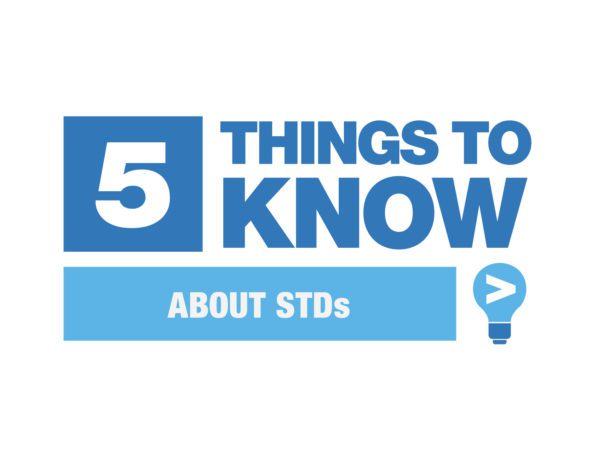HIV/AIDS
HIV is a virus that attacks the immune system and can lead to AIDS, a clinical diagnoses that indicates an advanced stage of HIV. HIV may not show symptoms initially. Testing is recommended as a part of routine healthcare.
There is no cure for HIV/AIDS, but antiretroviral (ARV) prescription medications allow people with HIV to live normal, healthy lifespans. Consistent ARV use also prevents transmission to others. Left untreated, HIV can lead to death.
Find STD Testing Near You
Click on a question below to learn more about HIV/AIDS.
- How do you get HIV?
- What are the symptoms of HIV?
- What kind of tests are available?
- What treatment is available for HIV?
- What happens if HIV is not treated?
How do you get HIV?
The most common way to get HIV is through unprotected anal or vaginal sex with someone who is unaware they have HIV or who does not have their HIV controlled with antiretroviral (ARV) treatment.
Sharing needles, syringes or other injection-drug equipment with someone with HIV can also result in infection.
HIV can be passed during pregnancy, birth or through breastfeeding. Ongoing ARV treatment to achieve and maintain viral suppression both during pregnancy and postpartum substantially reduces the risk of perinatal transmission to less than 1%, but not zero. The U.S. Centers for Disease Control and Prevention (CDC) recommends that pregnant people living with HIV who have questions about breastfeeding or who want to breastfeed should receive patient-centered, evidence-based counseling on their infant feeding options.
HIV is not spread through casual contact, such as hugging or shaking hands. It also cannot be transmitted through the air or by sharing dishes, food or toilet seats.
You cannot get HIV through closed-mouth kissing or saliva. There is little to no risk of getting HIV through oral sex.
What are the symptoms of HIV?
As with many other sexually transmitted diseases (STDs), HIV often shows NO symptoms initially. The only way to know if you have HIV is to be tested.
However, some people do get sick during the first weeks after infection. This illness can be confused with the flu. Symptoms may include fever, tiredness, swollen lymph nodes, night sweats, joint and muscle aches, diarrhea and a rash.
When HIV is undiagnosed and untreated, it can cause serious health issues, including death. There is no cure for HIV, but there are highly effective medications, called antiretrovirals (ARVs), that can reduce the amount of virus in the body to undetectable levels. People with HIV who take ARVs as prescribed, and get and keep an undetectable viral load, can live long, healthy lives. When HIV is undetectable, it also cannot be transmitted through sex.
Click here for more about HIV testing.
What treatment is available for HIV?
Antiretrovirals (ARVs) are prescription medications that reduce the amount of virus in the body (viral load) of an individual with HIV. The goal is a viral load that is undetectable according to standard lab tests. This keeps the virus from damaging the immune system and causing illness. Maintaining an undetectable viral load also eliminates the risk of passing the virus to others through sex.
There are dozens of different ARVs available today that are highly effective at treating HIV. Treating the virus effectively requires combining two or more of these medications into a daily regimen. Some regimens are available in a single daily pill. For people who have had an undetectable viral load for at least three months, switching treatment from pills to a shot may be an option. A healthcare provider can advise on the best treatment regimen.
How do you treat HIV?
Antiretrovirals (ARVs) – prescription medications used to treat HIV – work to lower the amount of virus in the body (viral load), often to levels that are undetectable by standard lab tests. The vast majority of people who take their ARVs every day as prescribed and remain in care are able to achieve and maintain an undetectable viral load. In addition to improving health, getting and keeping a low viral load also prevents the spread of the virus to others.
A person diagnosed with HIV today who is on ongoing ARV medication and in medical care can live a normal, healthy lifespan and have children without HIV.
What happens if HIV is not treated?
Taking HIV treatment every day as prescribed prevents illness and the spread of the virus to others. Left untreated, HIV can lead to death.
Missing doses of antiretrovirals (ARVs) can cause the amount of virus in the body to rise. This may result in the virus becoming resistant to a particular HIV treatment, possibly making that treatment not work as well, including reducing the preventative benefits.
If you are having difficulty taking or keeping up with your treatment, talk with your healthcare provider as soon as possible and consider using additional strategies to prevent sexual HIV transmission. Your provider can work with you to help get you back on track, including trying different ARVs if needed.
The information on this page is adapted from the CDC and Planned Parenthood.
Getting Tested
HIV and other STD testing is available at most doctor’s offices and health clinics. Many health departments also offer testing. It’s fast, easy and most people pay little or nothing.

